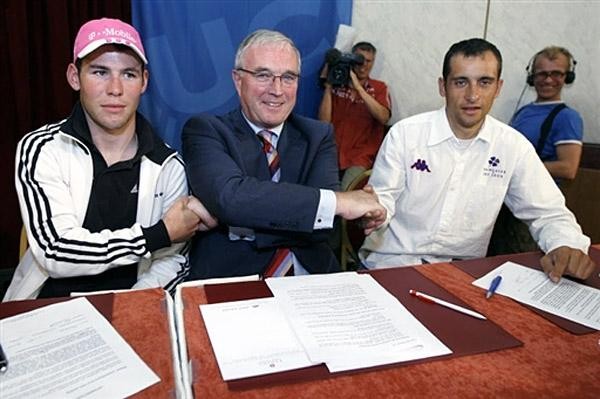UCI releases text of riders' anti-doping declaration
By Susan Westemeyer The UCI has released the text of the "Riders' commitment to a new cycling,"...

By Susan Westemeyer
The UCI has released the text of the "Riders' commitment to a new cycling," which 600 ProTour riders will be asked to sign before the Tour de France.
"I do solemnly declare, to my team, my colleagues, the UCI, the cycling movement and the public that I am not involved in the Puerto affair nor in any other doping case and that I will not commit any infringement to the UCI anti-doping rules. As proof of my commitment, I accept, if it should happen that I violate the rules and am granted a standard sanction of a two-year suspension or more, in the Puerto affair or in any other anti-doping proceedings, to pay the UCI, in addition to the standard sanctions, an amount equal to my annual salary for 2007 as a contribution to the fight against doping.
"At the same time, I declare to the Spanish Law, that my DNA is at its disposal, so that it can be compared with the blood samples seized in the Puerto affair. I appeal to the Spanish Law to organize this tests as soon as possible or allow the UCI to organize it."
This declaration was announced after the UCI's meeting Tuesday with team managers and team doctors in Geneva.
"The UCI will not tolerate any individual or organization that causes damage to our sport," UCI president Pat McQuaid said. "There is no reason that cycling and doping should be linked and no reason doping should overshadow our sport."
The declaration shows "the riders' engagement for a new sport", McQuaid said. "Riders, sponsors and the team managers are interested in zero-tolerance in doping questions, so they have to act." The UCI will publish on its website a list of the riders who sign the declaration. "This will show those who are reluctant to sign it," McQuaid commented further.
Get The Leadout Newsletter
The latest race content, interviews, features, reviews and expert buying guides, direct to your inbox!
In addition, the UCI is asking the teams to prohibit riders from using doctors other than team doctors. "Illegal practices will not be tolerated any more," according to McQuaid.
McQuaid has asked the teams not to use riders who do not sign, although he admitted the riders could not be legally obligated to sign it. "Of course you can say, that this is just a nice idea, but I am optimistic. I believe that there is a serious wish within cycling for change, and that this is one aspect."
Anne Gripper, head of the UCI's anti-doping program, said that she assumed that no rider who does not sign would start the Tour de France -- "not on legal grounds, but because of the ethical pressure." McQuaid agreed, "As I see it, there won't be any Tour start for riders who don't sign."
"This is a good way for the future. Now it is up to us, the riders are our employees," said Luuc Eisenga, technical director for T-Mobile Team. "This is absolutely a step in the right direction, even if some people see potential legal problems. That doesn't matter to the teams -- we have the power to accomplish this, and the unanimity of all 19 teams which were there yesterday was a good sign," Hans-Michael Holczer, Gerolsteiner team manager, told Cyclingnews. Holczer also acknowledged that "everyone can see that cycling is not free from doping."
In addition, the UCI announced that it has received about 1000 of the 6000 pages of the Operación Puerto documents from the Guardia Civil, but that the papers contained nothing new. McQuaid again called on the team managers to suspend riders involved in Operación Puerto, even if it is "still not clear" whether the documents can be used as grounds for such suspensions.